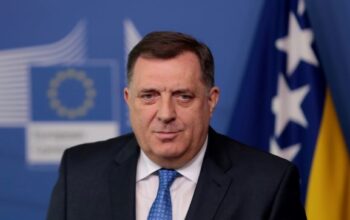Below is a transcript of US Deputy Secretary of State Chris Landau’s remarks at the 2025 NATO Parliamentary Assembly on May 23 in Dayton, Ohio.
On behalf of President Trump and Secretary Rubio, I’d like to thank Governor DeWine and Congressman Turner for hosting us. I’d also like to thank all of the assembled dignitaries who have traveled here from all over the world, especially from Europe and the Balkans. I’m delighted to welcome you to our country and honored to have you here today.
We’re gathered in a very special place at a very special time. Dayton, Ohio, is the home of the Wright brothers, Wilbur and Orville, who dreamed of powered airplanes and made that dream a reality on a December day in 1903 in Kitty Hawk, North Carolina. It never ceases to amaze me that this very first powered flight took place just 60 years before I was born, when my own grandfather was already 20 years old. The human race has come a long way in the historical blink of an eye, for good and for ill.
We’re also here at a special time, 30 years after Peace Accords for Bosnia were negotiated in this very city. For individuals or for nations, there are few more noble endeavors than seeking peace for yourself or others, and obviously seeking and promoting peace is the whole point of diplomacy, which is my job. So we honor those who came together in this place 30 years ago to hammer out peace accords.
Does that mean that those peace accords are perfect? Of course not.
Most peace agreements represent an attempt at compromise. Compromise is often not pretty—nobody gets 100% of what they want, but it’s better than nothing at all. The Dayton Accords of thirty years ago were heralded as “heroic and historic,” and indeed they did stop civilian bloodshed. But from the very beginning, the US summarized its goal as an agreement that was quote, “clear,” “limited,” and “achievable,” unquote.
This modesty of means and ends is appealing. I’m here today not to lecture but to listen to those of you from Bosnia and the region. We in the Trump Administration are willing to provide our good offices to improve conditions, but only if our involvement is wanted and warranted.
I know that this hasn’t always been the spirit in which American officials have approached foreign policy. But in this regard, as in many others, the Trump Administration is willing to try a different approach, and I’m proud to represent this new thinking.
In fact, my own background prepared me perfectly to represent this new thinking. My father was a career US diplomat. I was born in Madrid, Spain, while he was serving at the US Embassy there, and grew up in several countries in South American where he served as US Ambassador. So, while I’ve been an American since the moment I was born, I’m also used to seeing the United States and the world through the eyes of others. I respect and expect different viewpoints and recognize that not everyone is or wants to be exactly like me or my fellow Americans. We can love, and be proud of, our own country while recognizing the vast diversity of all the earth’s peoples.
President Trump picked up on this theme last week in his important foreign policy address in Riyadh. He acknowledged the disaster of US efforts at nationbuilding around the world in recent decades, and decried the arrogance of those who get off airplanes in foreign lands and think they have all the answers.
What does this mean for Bosnia-Herzegovina? It means that we’re willing to listen to, and to work with, all affected parties. Agreements must be firm to hold; but you must be flexible to adjust to changing times.
Let me be clear: the United States is not offering unlimited means for undefined, uncertain, or unrealistic ends. This basic point is lost on too many advocates for remaking foreign societies along utopian lines. We’re not interested in imposing a vision of a society that reflects the preferences of distant bureaucrats and narrow activists.
The United States can be a willing partner with considerable political capital. We can work hard; but we will work only with those committed to a practical realism for their own countries. We reject the two untenable extremes of wishing for transcendent transformation, on the one hand, or relitigating ancient grievances, on the other.
Endlessly expansive policy, without restraint and historical humility, becomes an enemy of strategy and constitutional statecraft. That is not our purpose, our function, or our mission.
People and societies are resilient, but they must choose to be resilient. And here I am talking not simply of leaders, but of peoples.
Durability and flexibility are hard to balance. Settlement agreements, both flexible and durable, require the consent and the consensus of all parties on the ground; they must reflect regional conditions and realities rather than being simply idealized and abstract impositions from above or from far away.
When different nationalities and value systems exist side-by-side, peace depends not on a military victory, which simply sets the stage for a rematch, but on compromises that allow all sides to live together.
Peace and development are defined by the human beings who must live with the consequences, not by lawyers, academics, or think tanks.
So I think we can say that the Dayton accords were a success without saying that the accords are perfect in theory or in practice. I’m here to express the Trump Administration’s willingness to listen and play a constructive role for all parties.
In conclusion, to the people of Bosnia-Herzegovina and its neighbors, we extend a hand of friendship and willingness to help. And to all of you, I appreciate your time and attention. Thank you.

